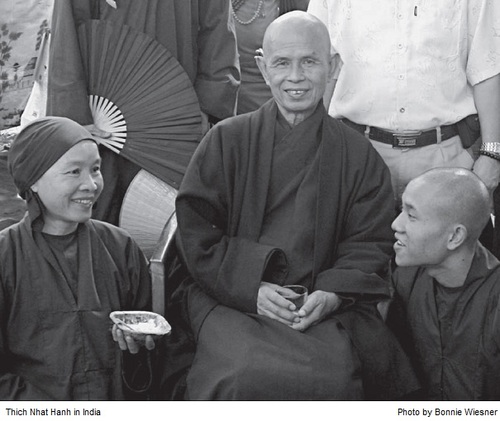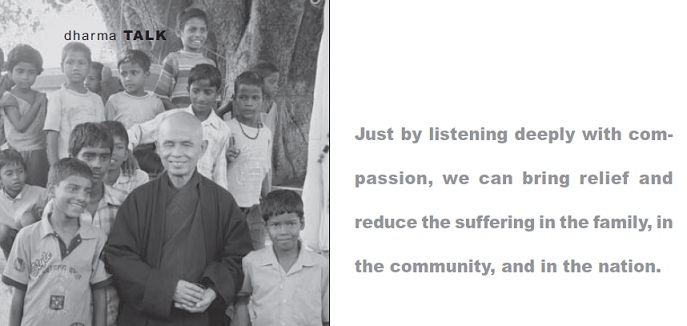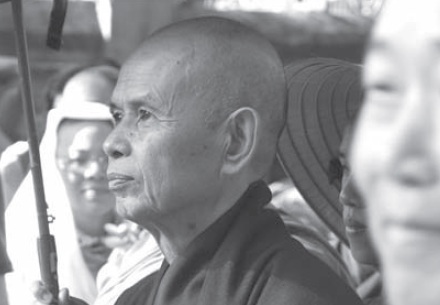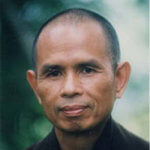
Unexpectedly, while on tour in India, Thay was invited to speak to the Parliament of India. On October 17, Thay addressed the assembly and many dignitaries.
Honorable Speaker, honorable Secretary-General, distinguished Members of Parliament,
In this time of turmoil, in this time of violence, anger, fear and despair, every one of us suffers. The people suffer and also the leaders suffer. A spiritual dimension developed in our leaders may help to bring more insight and peace so that our leaders can find a way out for all of us.

Unexpectedly, while on tour in India, Thay was invited to speak to the Parliament of India. On October 17, Thay addressed the assembly and many dignitaries.
Honorable Speaker, honorable Secretary-General, distinguished Members of Parliament,
In this time of turmoil, in this time of violence, anger, fear and despair, every one of us suffers. The people suffer and also the leaders suffer. A spiritual dimension developed in our leaders may help to bring more insight and peace so that our leaders can find a way out for all of us. Is it possible to bring down the level of violence, fear, anger, and pain? To me, the answer is yes.
Those in the society who believe that they are victims of discrimination and injustice blame it on the society and their leaders. They have the impression that no one has listened to them. They have tried but they have never succeeded in making themselves understood. So, the practice of deep listening should be used in order to give them the sense of being heard and understood.
Compassionate Listening
In a nation, there are those of us who are capable of being calm, who can sit down quietly and listen with compassion. Our leaders may like to invite those people to sit and listen to the sufferings of the nation, to the sufferings of the people. This kind of practice is needed for everyone – not just for the political leaders. Suppose a father does not have time to listen to his son or daughter. That father would not be able to understand the suffering and the difficulties of his son or daughter and will not be able to make them happy. Even if the father has time to sit down and listen, if in the father there is too much anger, pain, and despair, the quality of listening will not be good enough.
That is why, to listen to the suffering of other people, we should listen to our own suffering. But in our society not many people have the time to listen and understand their own suffering and difficulties. If we are able to listen to our own suffering and if we understand the true nature and roots of our suffering, then we will suffer less. We will be able to see a way out.
After that, we can listen to our loved ones, our community, our nation. And listening like that can bring relief because the people who are listened to in that spirit feel that they are now understood.
The Parliament could organize a session of deep listening, inviting wise and skilled spiritual people to come and sit down with our political leaders. Then we can invite those who think they are victims of social injustice and discrimination to come and we can say to them: “Dear people, we are here. We are ready to listen to what is in your heart and to hear about your suffering, your difficulties, and your despair.” Preparation like that may take some time.
The session of deep and compassionate listening can be televised so that the whole nation can participate in it. If the quality of listening is deep and good, people will feel that they are beginning to be understood, and then the level of anger, violence, and suspicion in our society will come down.
Practicing with Israelis and Palestinians
In our community of friends, we have tried this practice in many ways. We always succeed. Every year, we invite a group of Palestinians and Israelis to come and practice with us at Plum Village. Of course, at first they cannot look at each other, they cannot talk to each other. There is a lot of fear, anger, and suspicion. First, we offer them the practice of mindful breathing, mindful walking, and learning to recognize the pain, sorrow, fear in themselves. Supported by the practice of the whole community, they get some relief in their body and emotion from practicing in this way.
After about ten days, we teach them the practice of deep listening and loving speech. One group is given the time to tell the other group about all the suffering it has undergone, what kind of pain, injustice, fear, and despair it has experienced. They are asked to tell everything using the practice of loving speech. They do not condemn, blame, or accuse each other. You can tell everything in your heart but refrain from accusing, blaming, and using bitter language.

When you are in the group that listens, you have to practice mindful breathing and remind yourself to listen with compassion. We know that if we can sit and listen calmly like that for one hour, the speakers will suffer less and will feel that they are being understood. Many sessions of listening and loving speech can transform the situation.
When a group of people are expressing themselves, there may be a wrong perception or misunderstanding — a fear or anger that has no foundation — but we do not interrupt or correct them because interruptions will make them lose the inspiration to speak out. So, we continue to listen and we tell ourselves that later on, maybe several days later, we will provide them with some information so that they may correct their perceptions. Now we only listen.
While listening we can gain many insights into how the speakers have gotten the wrong perceptions that they have; and how fear, anger, violence, and hate are born from those wrong perceptions. We tell ourselves that later on we will help them by offering them information that will help correct these wrong perceptions that are the foundation of their anger, hate, and violence.
Discovering Our Wrong Perceptions
While we listen, we might find out that we ourselves have been victims of our own wrong perceptions, that we have misunderstood ourselves and that we have misunderstood the others. In the process of listening we can correct our own perceptions and later on we might tell them that we have had wrong perceptions that have brought about fear, anger, and hate; and that now that the wrong perceptions have been removed, we feel much better.
After a few sessions of listening like that, one begins to see the other side as human beings who have suffered exactly as we have. You feel sorry that they have undergone such suffering. When you begin to look at the other group with that kind of understanding and compassion, they feel very much better because you are looking at them with the eyes of understanding and compassion. You feel much better within yourself and they suffer less. So, the practices of deep listening, compassionate listening, and loving speech always bring reconciliation and always help to remove wrong perceptions.
By the third week together, groups of Palestinians and Israelis are able to sit down and share a meal, they can hold hands during walking meditation and enjoy nature together. Reconciliation has taken place. At the end of the retreat, they come as one group to report about the progress of their practice and always inform us that when they go back to the Middle East, they will organize sessions of practice like this for other Palestinians and Israelis.
The difficulties between husband and wife, mother and daughter, father and son can be resolved with that kind of practice of deep listening and loving speech. If a father does not understand the suffering or the difficulties of the son, how can he love him and make his son happy? Understanding is the foundation of love — understanding the sufferings and difficulties of the other person. But we have seen that if we do not understand our own suffering, our own difficulties, it will be hard to understand the suffering and difficulties of another person.
Terrorists Are Victims
In France where we live and practice, thousands of young people commit suicide every year because they do not know how to handle strong emotions like anger and despair. When you speak of terrorists, we know that in a terrorist, there must be a lot of anger and despair; that anger, violence and despair have come from somewhere. They have become victims of the kind of information they have been given. When people have the impression that they are not understood, no matter what they have tried.
To me terrorists are victims of wrong perceptions and many people become their victims. In order to help the terrorists, we have to listen to them, try to understand them, and help them to remove their wrong perceptions. They may think that we are trying to destroy their way of life, their civilization; based on that conviction they want to punish.
Looking deeply into the matter, I see that the roots of terrorism are wrong perceptions that have brought us to anger, fear, suspicion, and the willingness to punish. Our political leaders should be able to listen, to help the terrorists remove their wrong perceptions. We cannot remove wrong perceptions by using bombs and guns. How can you bomb a wrong perception? That is why violence does not work. Removing terrorism needs to be done with the practice of compassionate listening and the practice of loving speech. If we think we are too busy, if we do not take the time, we cannot heal the violence in our society. We must make the time to listen to our own suffering and to the suffering of our own family and our own nation.
Just by listening deeply with compassion, we can bring relief and reduce the suffering in the family, in the community, and in the nation.
The Role of Journalists
I was invited by the Times of India to be a guest editor for the edition of October 2. On the day I was working with the journalists, there was a series of blasts in the city. I was asked: What should journalists do when such a thing happens? After sitting quietly in contemplation, I said that we have to report about events in a way that helps to explain why such violent actions continue to happen. We have to show that anger, violence, and fear are born from wrong perceptions. If we ourselves understand, then we may be able to do something to help remove wrong perceptions, fear, and anger. If we do not know how to do this skillfully, then we will create collective fear and collective anger that will be very dangerous for the whole nation. The role of journalists is to report in a way that promotes understanding and compassion.
I also told the journalists that they need to report more on positive things in order to balance all the negative things that we are reading in newspapers and seeing on television. After finishing elementary school children have viewed one thousand acts of violence on television. They consume violence and fear every day. We have allowed the producers of television and films to poison our minds with fear and violence. When another person expresses a lot of fear and anger, we may take that poison into us. When we are reading an article or watching a program on television we may consume the fear. I suggest that the members of Parliament make time to discuss this, because the anger and violence we are consuming every day is causing us to react violently in our families and in society.

Non-Discrimination
I would like to offer a story about non-discrimination. My right hand can do many things that my left hand does not do. When I write, I always write with my right hand. When I use a bell, I use my right hand. Yet my right hand does not ever complain to the left hand saying, “Well I do everything and you do not seem to be very useful.” My right hand has the wisdom of non-discrimination. And my left hand does not suffer from the complex of inferiority.
One day I was hanging a picture. I was not very mindful and I hit a finger on my left hand with the hammer. Immediately my right hand threw down the hammer and held my left hand gently. It did not tell the left hand, “You must remember that I have helped you and in future you have to do something to help me.” My left hand did not tell my right hand, “You have done me an injustice. You have made me suffer by hitting me with that hammer.” My left hand and right hand have the wisdom of non-discrimination. That is why my left hand and right hand live in perfect peace and harmony.
If the father and the son look deeply at one another, they can see that the son is the child of the father and it is the son who brings the father into the future. If the father makes his son suffer then he himself suffers. When you are able to make your father smile, you are happy because your father is happy. It is your own happiness because happiness is not an individual matter.
Regarding the Israelis and the Palestinians, we can say that the peace, joy, and safety of one side have very much to do with the peace, joy, and safety of the other side. So, to take care of the peace, well-being, and safety of one side is to take care of the peace, joy, and safety of the other side. The same thing is true with Protestants and Catholics, Muslims and Hindus. We are all like hands of the same body. If we know that our happiness is not an individual matter, then we can take care of the happiness and safety of our brethren. So, the insight of non-discrimination is the foundation of harmony and peace. We must educate our young people about this. Once we realize that either we live together or die together as a planet, as a nation, we can reconcile and transform the anger and suffering in us.


